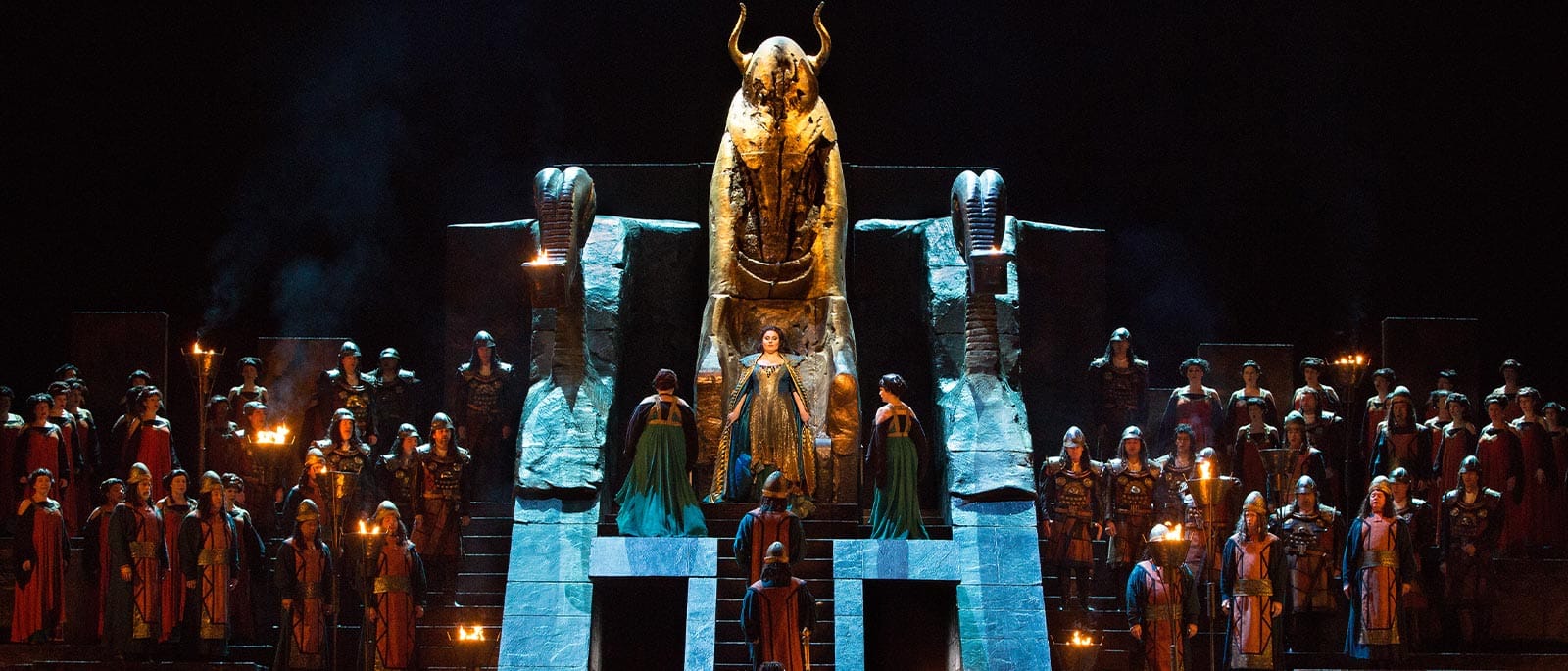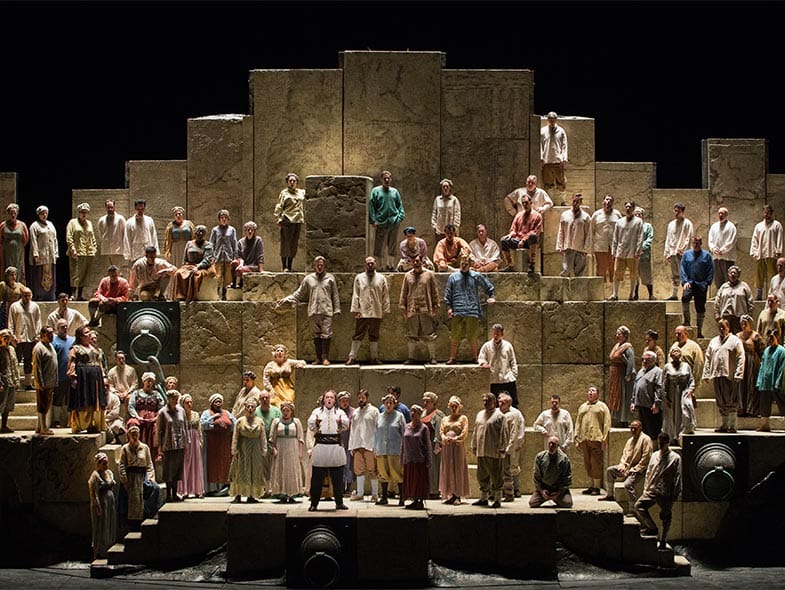Verdi's Nabucco from the Met: Monastyrska shines

Verdi Nabucco. Cast; Chorus & Orchestra of the Metropolitan Opera, New York / Daniele Callegari. Simulcast at Barbican Cinema One of performance from the Metropolitan Opera House, New York, 06.01.2024
Abigaille - Liudmyla Monastyrska
Fenena - Maria Barakova
Ismaele - SeokJong Baek
Nabucco - George Gagnidze
Zaccaria - Dmitry Belosselskiy
Anna – Brittany Olivia Logan
Abdallo – Scott Scully
High Priest of Baal – Le Bu
It is amazing to remember that Elijah Moshinsky’s production of Nabucco only arrived at te Met in 2001; it feels very much of another, earlier age, when money was no object and spectacle was, if not all, certainly a major consideration. John Napier’s revolving set is itself a dramatic masterstroke, silently turning to reveal completely fresh scenarios, including a remarkable staircase leading to a throne topped by an idol. Adreane Neofitou’s costumes nicely imply the time of the opera’s setting (Jerusalem and Babylon, around 586 BCE)
Costumes reflect the grandiosity of Moshinsky’s conception as well as placing the opera vaguely in teh mists of history, while lighting (Howard Harrison) is a masterpiece of atmospherics.
And yet, in Nabucco, not everything is grand, and it was up to the soloists and conductor to remind us of the internal machinations of the principal characters. The greatest laurels go to the conductor, Daniele Callegari, whose unerring ear for detail was ever married to an appreciation of the work’s structure. This might be relatively early Verdi (first performed at Milan on March 9, 1842 and the composer’s third opera), but it is a glorious score – a pointer, perhaps, that other early operas deserve more of our attention. Callegari treated the piece with respect in the delineation of textures, yet accorded it huge emotive force. His rapport with the Met orchestra was clear from the Overture, with its creamy brass and pinpoint ensemble. The spirit of early Verdi wafted through every phrase, both there and throughout.
The chorus is arguably the major participant in this opera (most famously in ‘Va, pensiero,’ of course, but that is only one of many choruses). Even at a remove and via the Barbican sound system, they were hugely imposing, capable of a huge dynamic range; each camera close-up revealed a face enrapt with concentration.

Of the soloists, it is Zaccaria that dominates the first act, here commandingly sung by Dmitry Belosselsky, his several arias all perfectly idiomatic. He was not quite the match for Mats Alngren in Gothenburg last year (seen in Jacopo Spirei’s production), but purely on its own terms it was fully convincing – and arguably more Verdian than Almgren’s somewhat more Wagnerian take.
But the titular character is Nabucco, and baritone George Gagnidze excelled. The part plunges into madness and back again, in the process converting Nabucco from despot (even Jehovah fears him, he thinks in act one) to Jehovah-convert. Gagnidze has both vocal and dramatic needs to convey all of this, not just convincingly, but poignantly. He matched and perhaps just overtook the psychological angst of the great Leo Nucci in Daniele Abbado’s production (also with Monastyrska) at Covent Garden in 2011: see my review).
In fact, both of the Nabucco performances I have reviewed for Seen and Heard International from Covent Garden have featured Liudmyla Monastyrska as Abigaille. It is one of the cruellest of soprano parts, requiring Wagnerian penetration at higher registers plus a mezzo-like strength down below. And Verdi swings between the two in huge leaps. While I found her variable in 2021, she was excellent in 2013 and now in New York, a decade-plus later, she is even finer. Subtlety has entered her assumption of this part, complementing her core of steel. Perhaps her acting is still somewhat lacking (maybe that element is for next time), but vocally this was exceptional.
Tenor SeokJong Baek was making his debut as Ismaele, and what a confident debut it was. He really made one wish that Ismaele had more to do – Baek has a vibrant, powerful voice, full of the ardent emotions of youth He is well complemented by the Fenena (who is in love with him in the plot), mezzo Maria Barakova, whose fine, pure voice and clear diction was a source of real joy, and who absolutely held her own in a cast of strong personalities. Small wonder she is toeing Wagnerian waters as Siegrune Walküre later this year, after performances as Fenena in Rotterdam, Dortmund and Paris.
The smaller roles were all well taken, with particular mention for Chinese bass-baritone Le Bu’s High Priest of Baal and a strong contribution from Scott Scully as Abdallo.
Camera work was generally good. There was a minimal use of floor cam (thankfully), and only a couple of errors (one glaring – a panorama shot several seconds before it was due). But this is a must-see. It has been full seven years since Nabucco was last staged at the Met, and this cast – and conductor – acted as a timely reminder of the piece’s stature.
The documentation provided on the freesheet by the Barbican is as shoddy as ever, however: only a partial cast list, and the synopsis of the first act makes no reference whatsoever to Zaccaria. Still, the fun of the broadcast’s ‘extras’ partially makes up for it: Here, it was Angel Blue, herself on stranger to the Met stage (or Covent Garden, for that matter) who did the honours in interviewing soloists live); a filmed interview with Callegari was also fascinating (he is pretty much steeped in Verdi, having conducted 21 of the master’s operas, with the 22nd on the cards for next year). Thee Met cinemacasts remain a fabulous night out, and the timing (1755 start) makes for a very civilised finishing time.
The Metropolitan Opera, New York performance featuring this producion (with different soloists and conducor) is available at Amazon via this link.
